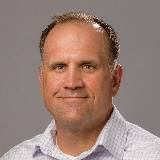
Professor of Exercise Physiology, Dr. David Hydock, raises awareness of prostate and testicular cancer, and shares how his research coincides with the Movember movement.
My name is David Hydock. I am a professor in the school of sport and exercise science and specifically in exercise physiology.
What is the background behind Movember?
Movember takes place in November and it is a men's health campaign for fundraising and awareness and the way I like to put it is, most people are familiar with October and when people are wearing pink such as NFL players, business professionals and that is very well recognized why that is. It is for breast cancer and it's the American Cancer Society's campaign for awareness, raising awareness and funds for breast cancer. And Movember, I actually stumbled upon seven years ago. So this is actually going to be the seventh year that I've been involved in Movember. And Movember is an international fundraising organization and November, which is Movember, is their biggest month and it is really a way to raise awareness and raise funds for men's health issues. Originally when it first started, or at least when I first started getting involved, it was specifically for prostate cancers and testicular cancers.
And to me that makes sense because individuals that have gotten very aware of breast cancer but prostate cancer and testicular cancer is still not...
Marketed?
Yeah. That's a good way to put it. It's not, it's not marketed, and it's still not well-publicized. It's still in this way of it...It's, fairly hidden when men are diagnosed with prostate cancers and testicular cancers. And because of that, the awareness is not as great and the fundraising is not as great. You know, breast cancer seems to have a celebration of survivorship, and it is fantastic to beat that. And when that happens, it's celebrated. And mentioning how long or how many year survivor or whatever it might be of breast cancer, is very well received. Whereas testicular cancer is diagnosed, it's one of the most common cancers in young men and prostate cancers, a very large percentage of, of men will eventually have prostate cancer, the prevalence is there in men. But the awareness is not necessarily there. Unless a loved one or you yourself have been diagnosed with that, then there's an awareness, but there's not this awareness across the board where we don't have NFL teams all participating in Movember. However, there have been a few players who have been part of Movember as well.
Is there a certain color that is affiliated? I mean, cause when I think breast cancer, it's the, the pink is there an affiliation with this cause?
Not with Movember itself. With prostate cancers, I believe there's a blue shoe event that typically takes place. But the thing that sets Movember apart is how it originally started was during the month of November, you wear a mustache. And it is a mustache only and it cannot be connected to a goatee or the rest of a beard. So it is very distinctive. That has kept people away a lot of times in not wanting to participate in Movember.
That's commitment.
It is. And it's a month long. And that's where it originally started. It has since changed a little bit. So there's some different ways to participate in November. Yes, committing to a mustache the entire month of November is one way, but there's another way that, as kind of a pledge, is to pledge to be physically active every day in November.
And so those, so men who are involved in a Movember are called Mo Bros, but it is not limited to men because we have had on our team, many Mo Sisters and Mo Sisters participate as well. It is usually by this physical activity pledge that even setting up individual homepages and such that you are dedicating to either running a certain distance or a certain time or walking a certain distance or time every day during the month of Movember.
So setting some sort of physical activity goal.
Yeah. And with each individuals space, Mospace, you actually log that every day so people can track you and see.
Right. Hold yourself accountable.
Yes.
How did you get into all of this?
Most of my research at UNC involves cancer treatment toxicities and involves looking at interventions to try to minimize those toxicities and specifically side effects. Most of my work is in skeletal muscle weakness and fatigue that comes with cancer treatments. And we look at how exercise can minimize that. We look at some nutritional interventions to try to minimize a fatigue that comes with cancer treatments because that is a huge side effect for many cancer patients. I've been doing this work at UNC since 2003.
I actually started and did my PhD at UNC and that started in 2001, and gravitated toward this line of research in about 2003. My dissertation was actually looking at the effects of a very common prostate cancer treatment on how the heart functions, so cardiac function, and how exercise plays a role in minimizing that. So one of the treatments, for example, that I looked at was a drug that reduces testosterone levels because that's something that fuels prostate cancer growth. And so it's, it's almost a chemical castration, if you will, to try to halt the progression of prostate cancer cells. And after I was done with that, knowing that I was going to continue on with the cancer treatment toxicity and side effect research line, I don't even remember how I stumbled across Movember, but I saw this as a way to start trying to spread the word.
Advocating.
Yeah. And trying to get the word out about and advocating about and raising awareness about things like prostate cancer and testicular cancer, which is where Movember and the Movember Foundation started was with cancers. Uh, but Movember's has actually added some things to advocate and raise awareness for men's health. So the third kind of arm of Movember is now mental health because of, again, mental health in men.... it's pretty hidden a lot of times if there are mental health issues and the suicide rates in men versus women are much different. So, the overall goal and reach of Movember is to, whether it be with these cancers, whether it be with the mental health issues is to try to reduce men dying early and dying prematurely. And they've actually, the last I saw was by 2030, they'd like to have that reduced by 25%.
With the research we're doing, it's been continuing and we've been doing a lot of work to try to minimize side effects. That's really the primary work I do. And since prostate cancer patients, testicular cancer patients, most cancer patients are eventually going to undergo some sort of treatment, many of those treatments have pretty bad side effects. And, depending on the type of treatment, whether it be a radiation treatment or hormone treatment or chemotherapy treatment, those side effects might be different from person to person based off of their treatments, even though they may have the same diagnosis - It kind of depends on the stage and such. So, there's always pretty personal or personalized or individualized treatments many times. And those side effects can really cause issues for quality of life and even mental health and depression and all of that. So it's a pretty big picture that I've got in terms of where Movember plays a role in that. One of the things that Movember funds is the prostate cancer foundation. They also fund things like Livestrong and and some mental health foundations specifically. But in order for this research to continue, and not just the research that I'm involved in, but all cancer research, there has to be funding. And that's where Movember comes in. And even, you know, in October, that's where the American Cancer Society comes in. I also participate in a Real Men Wear Pink campaign in October through the American Cancer Society to try to raise money specifically for breast cancer research. So, you know, October and November are kind of my fundraising months but I definitely need help. I need a team, especially in Movember.
You know, in October if I'm wearing pink, people know why. In November, on November 28th, if I have a mustache, people are concerned first and then, and then they, they don't really necessarily ask why. So I just need more on my team. I've had most of my graduate students who work in my lab participate, men and women. There are plenty of men who also join the team who do choose not grow mustaches but are physically active and add that as part of their approach with Movember.
I've had a Movember team and I'm the team captain. We are called the Upper Crustash because we are the elite of all mustache wearers. So there is a team page through www.Movember.com. Individuals can donate to the team. They can also donate to individuals on the team specifically. So it's a very easily navigable website for the Movember teams and Movember individuals. So you can pull up the team, donate to the team as a whole, or pull up an individual on the team and donate just to that individual - It's still collected into the team but it shows just for that in the individual who raised that money. Each individual can track things through Movember. So there is a MoTacker where you can actually upload images or photos of the mustache progression through the month as well as, as a MoTracker for physical activity that individuals can add every day like, 'I ran a mile and a half' or 'today I walked for 45 minutes' or 'I lifted weights for this long, or whatever it might be.'.
The Mo the merrier.
Exactly.
Music:
Jazzar – Dogs Cats
Jazzar – Montmartre




